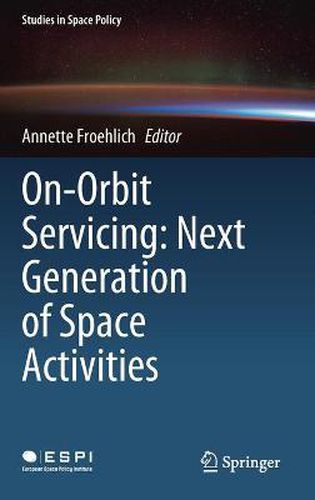Readings Newsletter
Become a Readings Member to make your shopping experience even easier.
Sign in or sign up for free!
You’re not far away from qualifying for FREE standard shipping within Australia
You’ve qualified for FREE standard shipping within Australia
The cart is loading…






This title is printed to order. This book may have been self-published. If so, we cannot guarantee the quality of the content. In the main most books will have gone through the editing process however some may not. We therefore suggest that you be aware of this before ordering this book. If in doubt check either the author or publisher’s details as we are unable to accept any returns unless they are faulty. Please contact us if you have any questions.
This book shares a range of new and diverse insights on On-Orbit Servicing (OOS), and examines its implications especially from political, legal, economic, and security perspectives. OSS has been evolving rapidly and presents both challenges and opportunities, such as in-space repairs, refuelling, refurbishment of spacecraft and servicing satellites, which could play a critical role in extending satellite lifecycles, while also representing a valuable next step in debris mitigation.
At the same time, many legal questions have arisen in connection with OOS: the need to prevent hostile actions under the pretext of OSS; the distinction between governmental and non-governmental OOS operators; the status of re-worked and recycled space objects; the issue of control in terms of operations performed in orbit, i.e., in the international sphere; the status of objects manufactured in orbit and applicable law, including liability and registration; and the impacts on insurance law and risk management. Finally, the book examines the implications of OOS for emerging space actors in the Global South, and recommends a paradigm shift to help developing countries fully recognise the necessity and urgency of being involved in discussions on OSS, as opposed to leaving it up to the developed space actors. This book will be of great interest to practitioners, academics, and students working in the space sector and related fields.
$9.00 standard shipping within Australia
FREE standard shipping within Australia for orders over $100.00
Express & International shipping calculated at checkout
This title is printed to order. This book may have been self-published. If so, we cannot guarantee the quality of the content. In the main most books will have gone through the editing process however some may not. We therefore suggest that you be aware of this before ordering this book. If in doubt check either the author or publisher’s details as we are unable to accept any returns unless they are faulty. Please contact us if you have any questions.
This book shares a range of new and diverse insights on On-Orbit Servicing (OOS), and examines its implications especially from political, legal, economic, and security perspectives. OSS has been evolving rapidly and presents both challenges and opportunities, such as in-space repairs, refuelling, refurbishment of spacecraft and servicing satellites, which could play a critical role in extending satellite lifecycles, while also representing a valuable next step in debris mitigation.
At the same time, many legal questions have arisen in connection with OOS: the need to prevent hostile actions under the pretext of OSS; the distinction between governmental and non-governmental OOS operators; the status of re-worked and recycled space objects; the issue of control in terms of operations performed in orbit, i.e., in the international sphere; the status of objects manufactured in orbit and applicable law, including liability and registration; and the impacts on insurance law and risk management. Finally, the book examines the implications of OOS for emerging space actors in the Global South, and recommends a paradigm shift to help developing countries fully recognise the necessity and urgency of being involved in discussions on OSS, as opposed to leaving it up to the developed space actors. This book will be of great interest to practitioners, academics, and students working in the space sector and related fields.